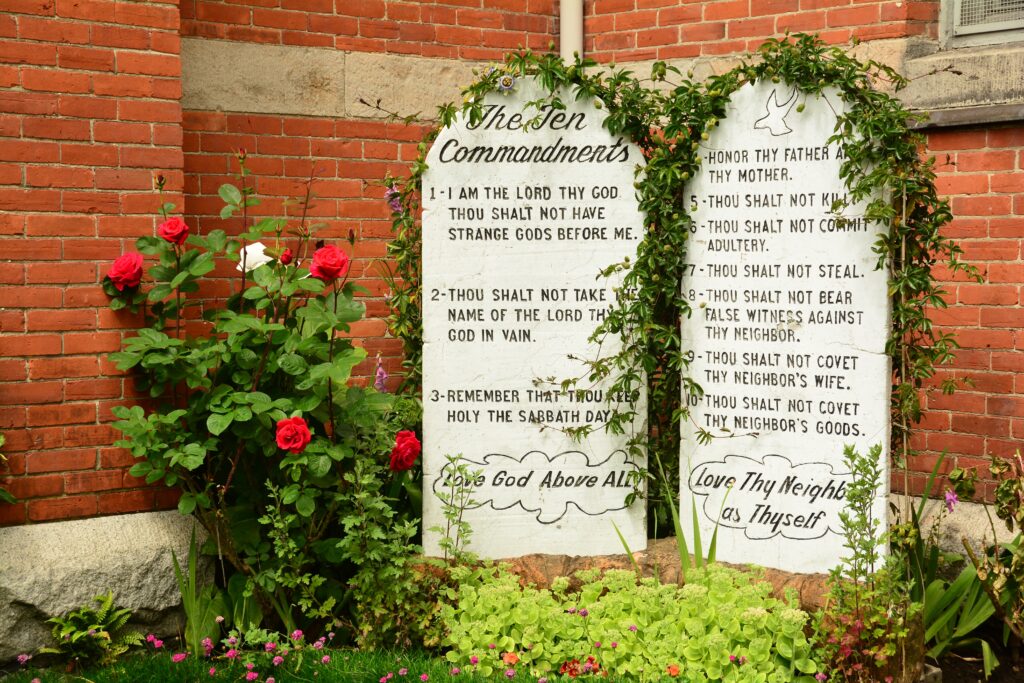
The importance of the Ten Commandments is made obvious time and time again throughout the Word. It is obvious from the fact that these commandments were the first part of the Old Testament to be written down. The Lord wrote these commandments on two tables of stone, and He did this before the first five books of the Word were written down though Moses. The way in which the Decalogue (or Ten Words) was given also bears testimony to its importance. To give the Ten Commandments, the Lord came down in fire upon Mount Sinai, and the mountain then smoked and shook, and there were thunderings, lightning, a thick cloud, and the voice of a trumpet. Before the commandments were given, the people were sanctified for three days, and then bounds were set around Mount Sinai, lest anybody besides Moses come near it and die. Later the tablets of stone were placed in the ark, and the place in the tabernacle where they were kept was called the Holy of Holies. After this, miraculous powers were associated with these two tables of stone. By means of the ark, the waters of the Jordan were stopped, so that the people could enter the land of Canaan on dry ground. Also, it was by means of the ark that the walls of Jericho came tumbling down.
In these and many other ways, the Old Testament stresses the overriding significance of the Ten Commandments. And both the New Testament and the Writings do likewise: they teach the supreme importance of obeying what the Lord says in these ten rules of life.
And yet, for all this, the remarkable thing is that the Ten Commandments are so brief. They are only 17 verses long. Some of the commandments are only two words long in Hebrew. And altogether there are only ten of these commandments. Man-made laws by which society is governed are so numerous that they fill volumes, and require experts to administer them. But for the government of every conceivable aspect of spiritual life, the Lord has given us only ten simple rules. There is no evil whatsoever that is not forbidden by the Ten Commandments. Conversely, there is no heavenly good which cannot be attained through obeying them. Why, then, are so few commandments necessary?
We all know well that there are very many different kinds of evils–evils which tempt the human race. And most of us, surely, if we are honest, could list hundreds of different evils we have committed at one time or another. Yet the fact is that all the different evils mankind has or ever could commit, bear relation to only ten basic evils. The ten evils forbidden by the commandments are really the only evils there are, though these evils may take thousands, indeed millions, of different forms. Therefore by fighting against each one of these evils in at least some way, we resist the whole spectrum of evil and make it possible for the Lord to gradually remove from us the desire to commit any evil whatever.
The Ten Commandments, by containing the whole of heaven, and standing in opposition to everything of hell, have tremendous power. We can sense this power. And we can sense it in two ways.
The power of the Ten Commandments is most apparent in their majesty. No human prose could ever be compared with the majestic words of the Decalogue. In them, we can sense something of the awesome power and majesty of the Lord Himself, our absolute King, whom we must serve and obey.
The Lord wants to make us happy, and therefore He has told us what to do if we are to be happy. The Ten Commandments are nothing else than the Lord showing us the way to heaven and to eternal happiness.
At other times we experience the power of these commandments in another way. The Decalogue stands in absolute opposition to evil in any form. And we all love evil in some way or another. None of us can really study these commandments without being made to feel guilty to some degree. They make everybody feel uncomfortable. Yet the fact that we may feel uncomfortable is unimportant. What is important is the way in which we react to this discomfort.
It is easy to ignore something which makes us feel uncomfortable. It is easy to invent excuses for avoiding something we do not want to face. But if we would value our eternal destiny, then we must not ignore any of the Ten Commandments. If our lives do not measure up to these all‑encompassing rules of life, and if we are thereby made to feel uncomfortable and guilty, then we must bravely accept that we have done wrong; we have sinned. To acknowledge our mistakes is not the end of the world. Everybody has faults. Everybody has committed sins. But not all people can admit that they have sinned. Not all people have the courage to say that they have disobeyed the Lord’s commandments. Instead, they make excuses, all kinds of excuses, rather than honestly admit to themselves and to the Lord that they have, without any excuse, done evil.
The reason we like to avoid admitting this is simple. Once we admit that we have done wrong, we must then compel ourselves to bring our lives into order. We must change the way we have been living. We must give up the evils we have been indulging in, even though we love committing them. We must mend our ways. It is as simple as that. No excuses we may dream up will exempt us from obeying the Lord.
The Lord knows we are not perfect. He knows that nobody can intelligently and honestly evaluate his or her life according to the Decalogue and find no sin. The Lord does not demand perfection. As David says: “If You, LORD, should mark iniquities, O Lord, who could stand?”(Ps. 130:3) On the other hand, the Lord does not expect us to make excuses to avoid obedience. Nobody can deliberately absolve himself or herself from obeying these rules of life, and expect to be happy.
The Lord wants to make us happy, and therefore He has told us what to do if we are to be happy. The Ten Commandments are nothing else than the Lord showing us the way to heaven and to eternal happiness. To step outside of these laws, and to obstinately seek our own way to happiness, will inevitably bring us frustration and unhappiness. It will bring misery. It will bring us hell.
If you want to be conjoined with the Lord, if you want to be happy, if you want to go to heaven, then you must do what the Lord tells us to do in His Ten Commandments. The testimony of all Scripture, the essence of all religion is this: we must believe in the Lord and do what He says. This is the path and the only path, to heaven and to everlasting happiness. As the Lord Himself tells us in the Book of Deuteronomy: “Therefore you shall be careful to do as the LORD your God has commanded you; you shall not turn aside to the right hand or to the left. You shall walk in all the ways which the LORD your God has commanded you, that you may live and that it may be well with you, and that you may prolong your days in the land which you shall possess” (Deut. 5:32,33).
Therefore you shall be careful to do as the LORD your God has commanded you; you shall not turn aside to the right hand or to the left. You shall walk in all the ways which the LORD your God has commanded you, that you may live and that it may be well with you, and that you may prolong your days in the land which you shall possess.
Deut. 5:32,33.
